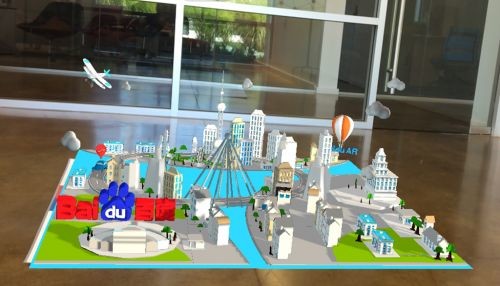Beijing time January 19 news, Baidu recently established AR laboratory. According to an online edition of Forbes magazine, Baidu first focused on the development of mobile AR applications rather than related glasses or headsets, arguing that this is the fastest way to promote AR technology. Baidu also integrated AR technology in products such as search and maps, and cooperated with several brands to promote AR technology. AR marketing has begun to rise in China. Alibaba and Tencent have also launched AR smart-phone games and used coupon incentives to stimulate users to experience AR technology. According to Wu Enda, AR's development in China is much faster than in other countries.

Baidu is vigorously developing AR technology
The following is the full text of the article:
Although Pokémon Go played an important role in educating the general public about augmented reality (AR) technology, Baidu believes that the game is by no means the only way to make this future media popular.
Baidu began researching AR technology two years ago and has recently established an AR lab to develop related services in education, health care, marketing, and tourism. Baidu has partnered with global brands such as L'Oreal, KFC, and Lancome to create AR advertising. The ad can allow Chinese consumers to interact with computer-generated virtual products through smartphones.
Baidu AR Labs also established an AR project to restore Beijing's historical sites. After the user scans a specific photo with the smart machine, he can see the restored Beijing historical sites. The AR effect is activated when the user directs the mobile phone at the selected monument.
For Baidu, the prospect of these AR services in China is much brighter than in the United States. Here are two reasons:
Give priority to developing mobile AR applications
By focusing on developing mobile AR applications instead of developing related glasses or headsets, Baidu has targeted hundreds of millions of Chinese smartphone users, arguing that this is the fastest way to promote AR technology.
Baidu has integrated the AR experience in its search applications, mapping services, and e-commerce providers. These services add up to more than 1 billion monthly active users. In the search application, Baidu will provide AR effects for relevant keywords entered by the user. Baidu maps can provide users with interactive 3D routes that can be superimposed on the real world.
"The development of AR in China is much faster," said Baidu chief scientist Andrew Ng at the beginning of this week. "The growth comes from mobile AR applications, which will be the way for most users to experience AR technology in the short term."
Neo Zheng, an analyst at market research firm IDC, said that mobile AR will start to develop in 2017.
The rise of AR marketing
In addition to entertainment factors, some Chinese technology companies also provide incentives for consumers to try AR and embed digital "coupon" that can be used in real physical stores.
Last December, Baidu teamed up with Yum Brands to launch an AR smartphone game for 300 KFC stores in Beijing. The game provides consumers with an opportunity to obtain dining discounts by scanning stickers on the table. Baidu said that the game had 400,000 downloads in the first three days.
At the same time, Alibaba Group and Tencent Holdings are not far behind. The two companies launched AR smart games to celebrate this year's Lunar New Year. Ali provided digital coupons worth more than US$4 million in the game, covering 20 foreign brands.
"Before Pokémon Go, AR technology has not been used so effectively," said Wang Xiaofeng, an analyst at market research firm Forrester. "But in China, AR marketing really develops very quickly."
According to Baidu’s expectations, future AR technology can also be used in other fields such as education, entertainment, healthcare, and tourism. Last year, Baidu cooperated with the Hubei Provincial Government to develop a 3D interactive map for the Shennongjia scenic spot to show information on hotels and hiking routes.
"This year, we will integrate AR technology into more industries," said Wu Zhongqin, head of Baidu's AR Lab. "We have a lot of work to do to improve these AR technologies."
What are the best batteries for solar? Batteries used in home energy storage typically are made with one of three chemical compositions: lead acid, lithium ion, and saltwater. In most cases, lithium ion batteries are the best option for a solar panel system, though other battery types can be more affordable.
If you install a solar battery today, you will likely need to replace it at least once to match the 25 to 30 year lifespan of your PV system. However, just as the lifespan of solar panels has increased significantly in the past decade, it is expected that solar batteries will follow suit as the market for energy storage solutions grows.
The most important ones to use during your evaluation are the battery`s capacity & power ratings, depth of discharge (DoD), round-trip efficiency, warranty, and manufacturer. Capacity is the total amount of electricity that a solar battery can store, measured in kilowatt-hours (kWh).
Batteries used in home energy storage typically are made with one of three chemical compositions: lead acid, lithium ion, and saltwater. In most cases, lithium ion batteries are the best option for a solar panel system, though other battery types can be more affordable.
12V Solar Battery,Solar Battery Storage,Solar Deep Cycle Battery,Lithium Batteries For Solar Systems 12V
Shenzhen Glida Electronics Co., Ltd. , https://www.szglida.com
